Urban Ag / Controlled Environment Agriculture
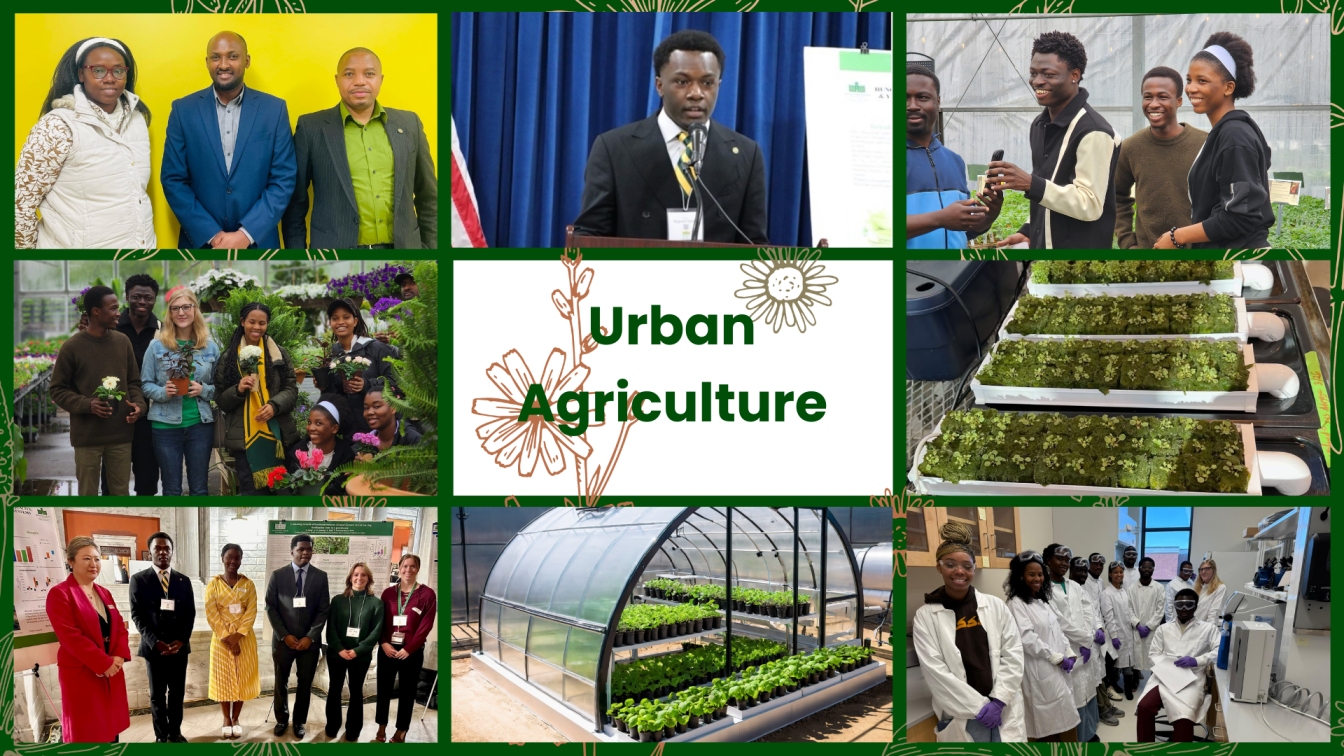
Program Overview
Kentucky State University's College of Agriculture, Health, and Natural Resources provides a transformative experience for students through its Urban Ag / Controlled Environment Agriculture (CEA) Program—a place of active, hands-on learning for creating sustainable, equitable, and resilient food systems. Through the collaborative effort of a diverse team of student research assistants and committed staff, the program focuses on food production in urban areas using cutting-edge and environmentally sustainable agricultural methods.
Missions
Student research assistants in the Urban Agriculture/ CEA program learn about various aspects of agriculture: controlled environment agriculture, research methodology, team building, and food production. This program also supports staff and student research projects, lab activities, and course-based projects.
Under the leadership of Dr. Theoneste Nzaramyimana, the team runs a student-run farm on the Kentucky State University Harold Benson Farm field and greenhouse for food production, research, and education. Students donate fresh vegetables to the campus and community during the harvest seasons to reduce local food insecurity and promote healthy nutrition.
Each graduate student leads a research thesis project where they learn about controlled environment agriculture systems and methods to create a more sustainable and efficient growing methods. Students study the influence of fertilization on hydroponic production, they also assess the effects of different light intensities and colors on plant health and performance. They are also studying the effects of different substrates and mulch on crop yield and phytonutrient accumulation.
Further, students get experience in extension and outreach by assisting with demonstrations, tours, and community engagement. The Urban Ag team strives to serve the community and small farmers by providing information and demos in urban and controlled environment agriculture systems and methods based on their research findings and experience. They also help the community by providing resources to healthy vegetables for nutrition and development information for help expand their urban gardens. They aim to empower the community to grow their own fruits and vegetables in their own urban gardens to strengthen local food systems and reduce food insecurity.
What is Urban Agriculture ?
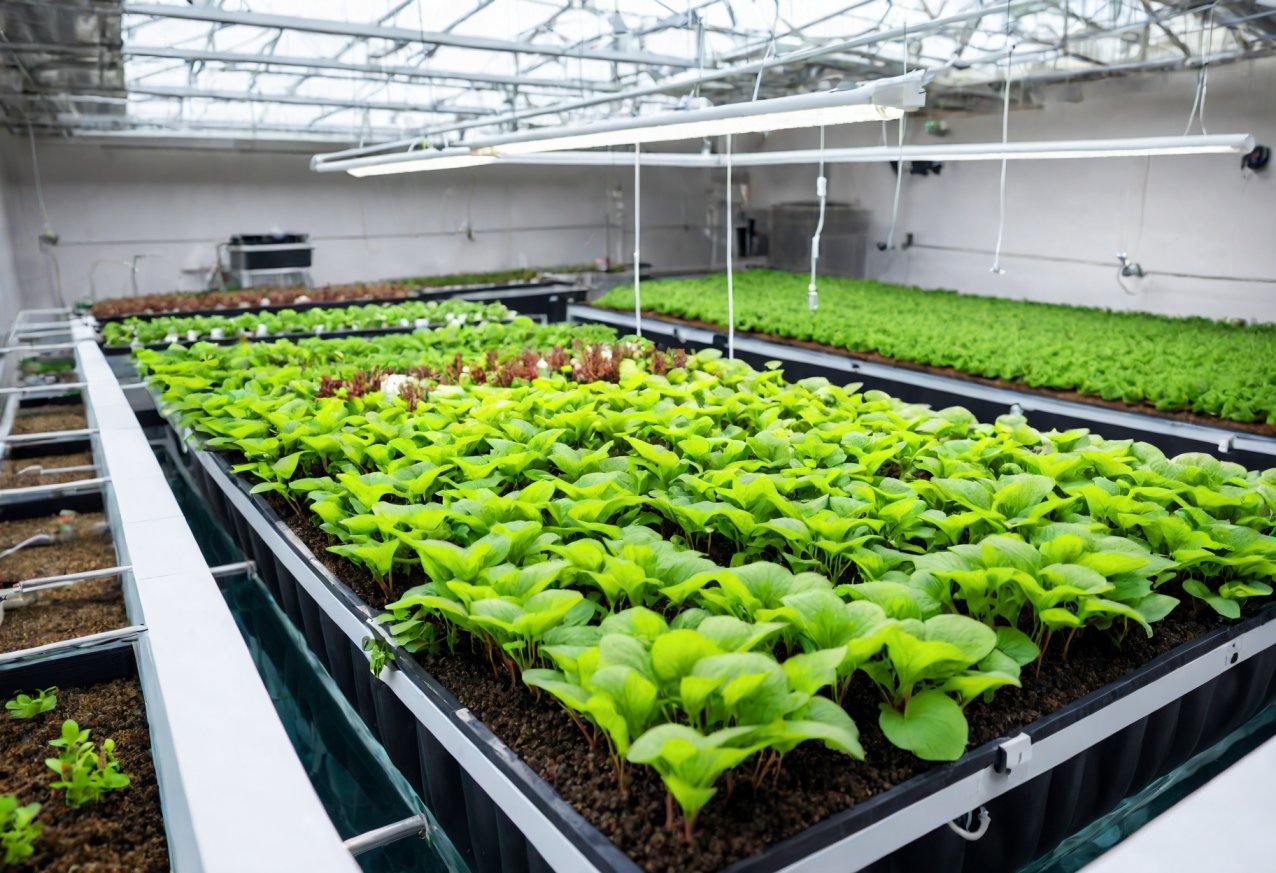
Urban agriculture, or controlled environment agriculture, is the practice of growing food in cities using modern techniques that allow the producer to manage the conditions in which food is grown. It includes hydroponics, aquaponics, vertical farming, and green house growing and food production in places like rooftops, warehouses or unused buildings.
The producer has the ability to control factors like temperature, humidity and light to produce food consistently, producing high quality food regardless of outside conditions. Urban agriculture / controlled environment agriculture helps to create food equity, reduce food transportation costs, and support sustainable and healthy living in urban areas.
Why is Urban Agriculture Important?
Urban agriculture can positively impact communities in many ways. It can improve access to healthy food, promote community development, and create jobs. Agriculture is a major contributor to greenhouse gas emissions and climate change. Research, education, and practice in agriculture are vital to developing sustainable food systems that produce healthy food while protecting the environment.
Food insecurity poses a significant problem in our world today and many people lack access to affordable, healthy, and fresh vegetables. Our team is committed to building more just and equitable food systems that give everyone access to healthy food and empower people to grow their own food.
Main Program Areas
Student Run Farm at Benson Farm
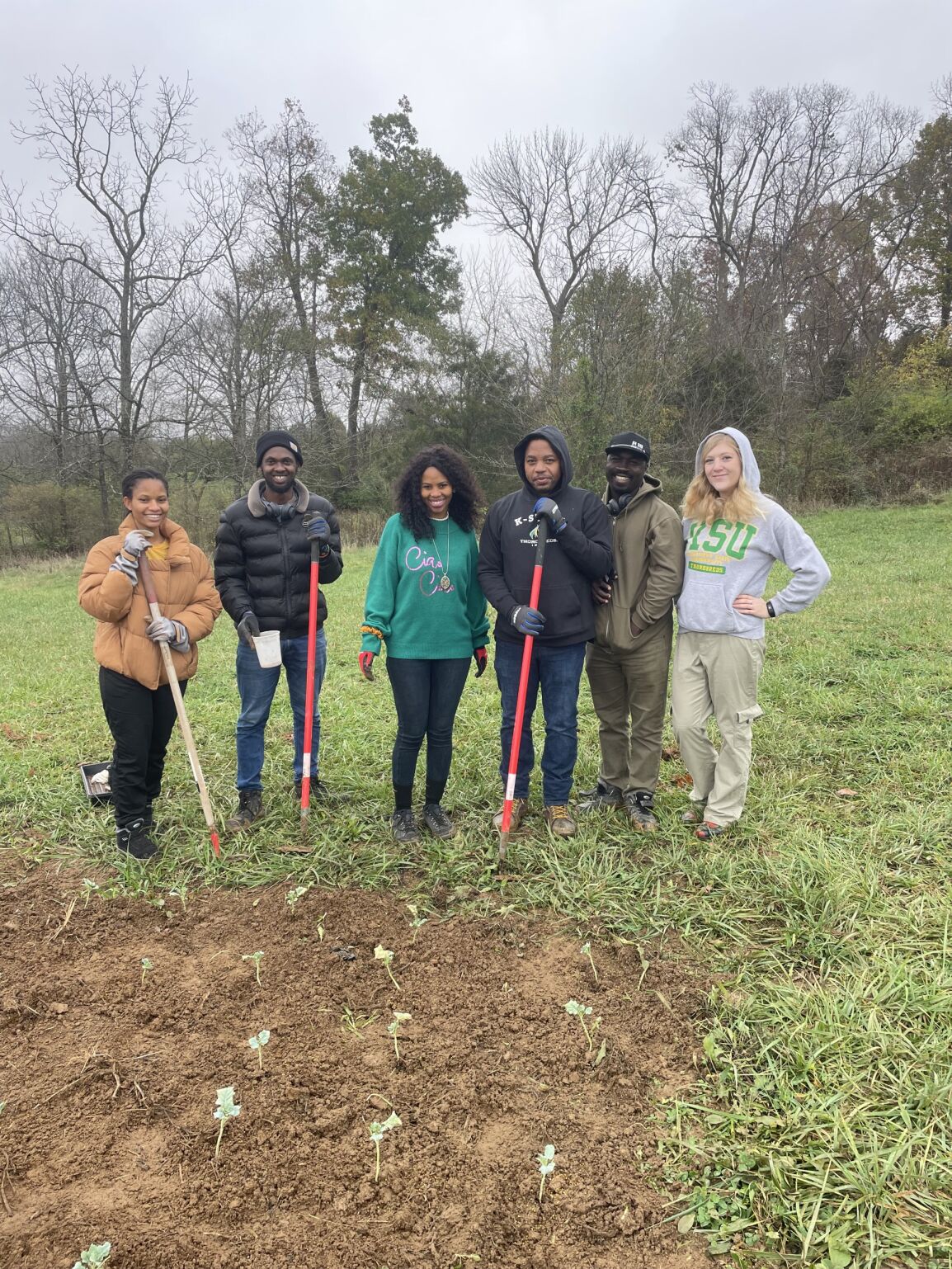
Students operate a student-run farm with an outdoor garden on the Harold Benson Farm in Frankfort, Kentucky. The farm has field plots and raised beds that the Urban Ag team use for annual and perennial crop production. They learn how to use farm tools, install drip irrigation, planting, pest management, and composting systems. Crops are produced using sustainable principles, including cover cropping, crop rotation, and natural fertilizers. They donate the produce to the campus body and local community to enhance nutritional status and decrease food insecurity in their community.
Greenhouse Management
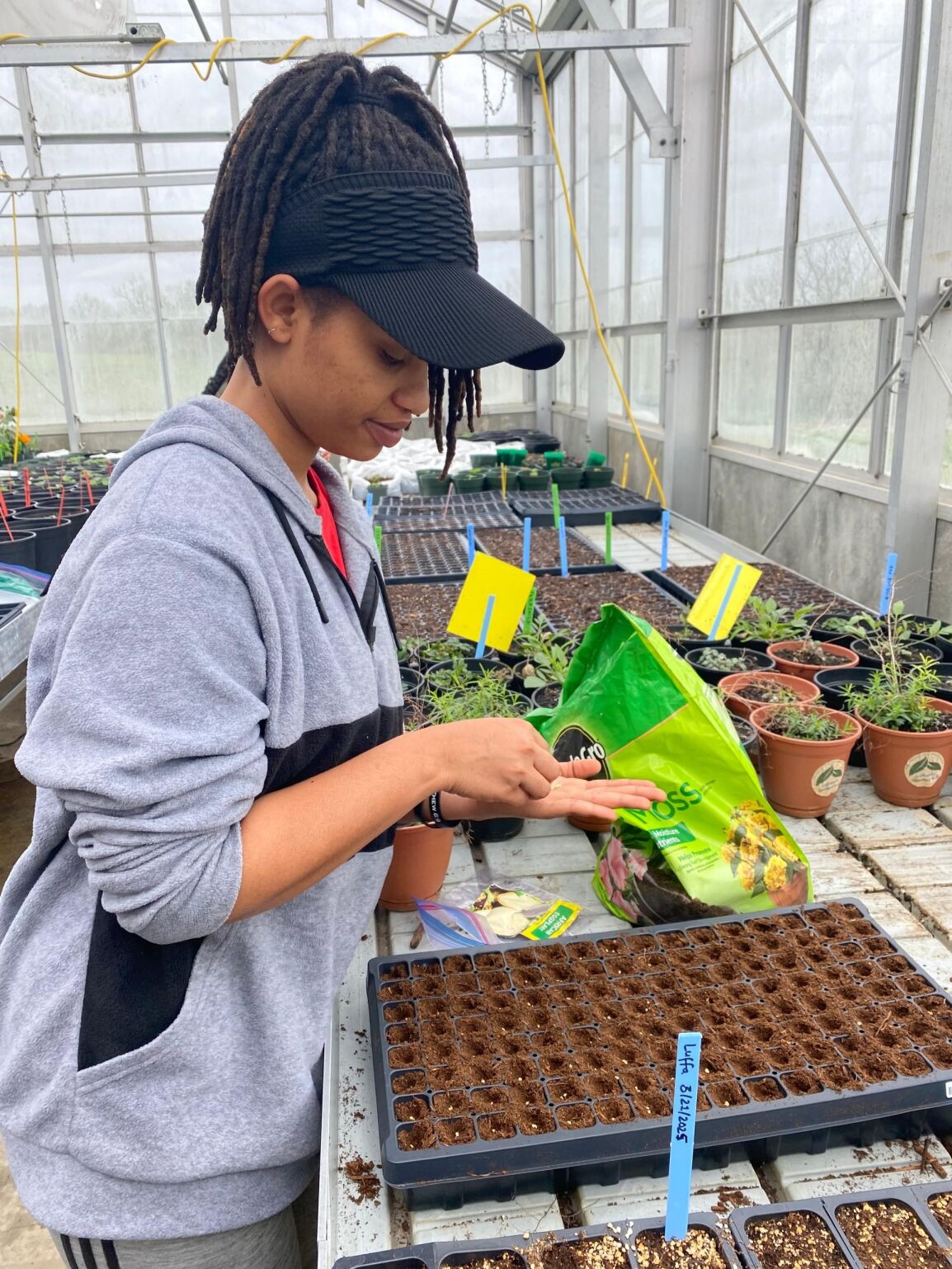
Students develop crop plans for production spaces and learn propagation, seeding, and transplanting methods. They also develop strategies for integrated pest management and plant disease mitigation in this controlled environment agriculture space at the Benson Greenhouse.
Hydroponics
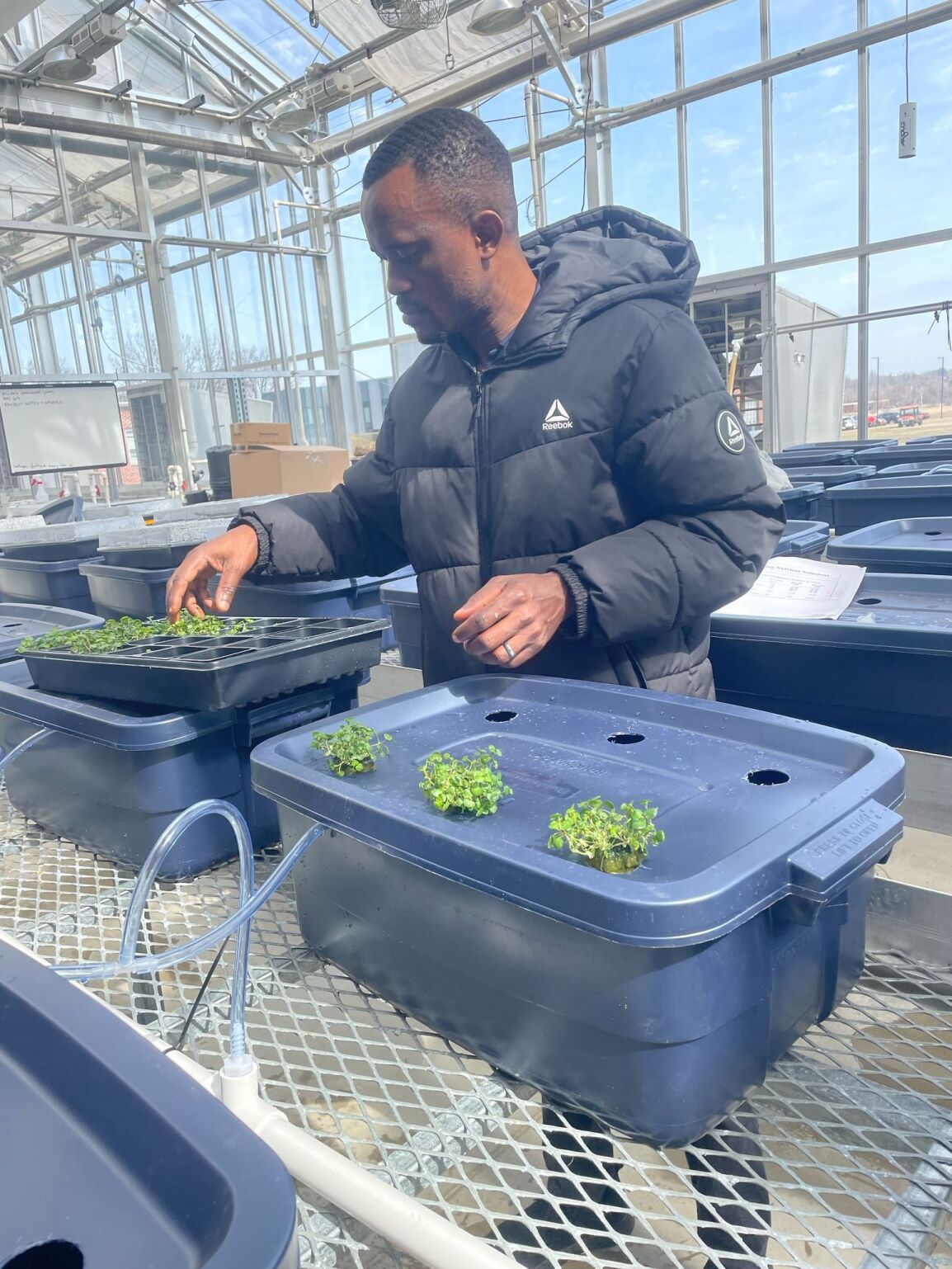
Hydroponics is a plant production method involving growing plants without soil using nutrient-enriched water. The greenhouse features hydroponic systems such as deep water culture and NFT systems that produce watercress, lettuce, kale, Swiss chard, and other leafy green vegetables. These systems are also used in research studies that study the effects of nutrient fertilization in leafy green production.
Aquaponics
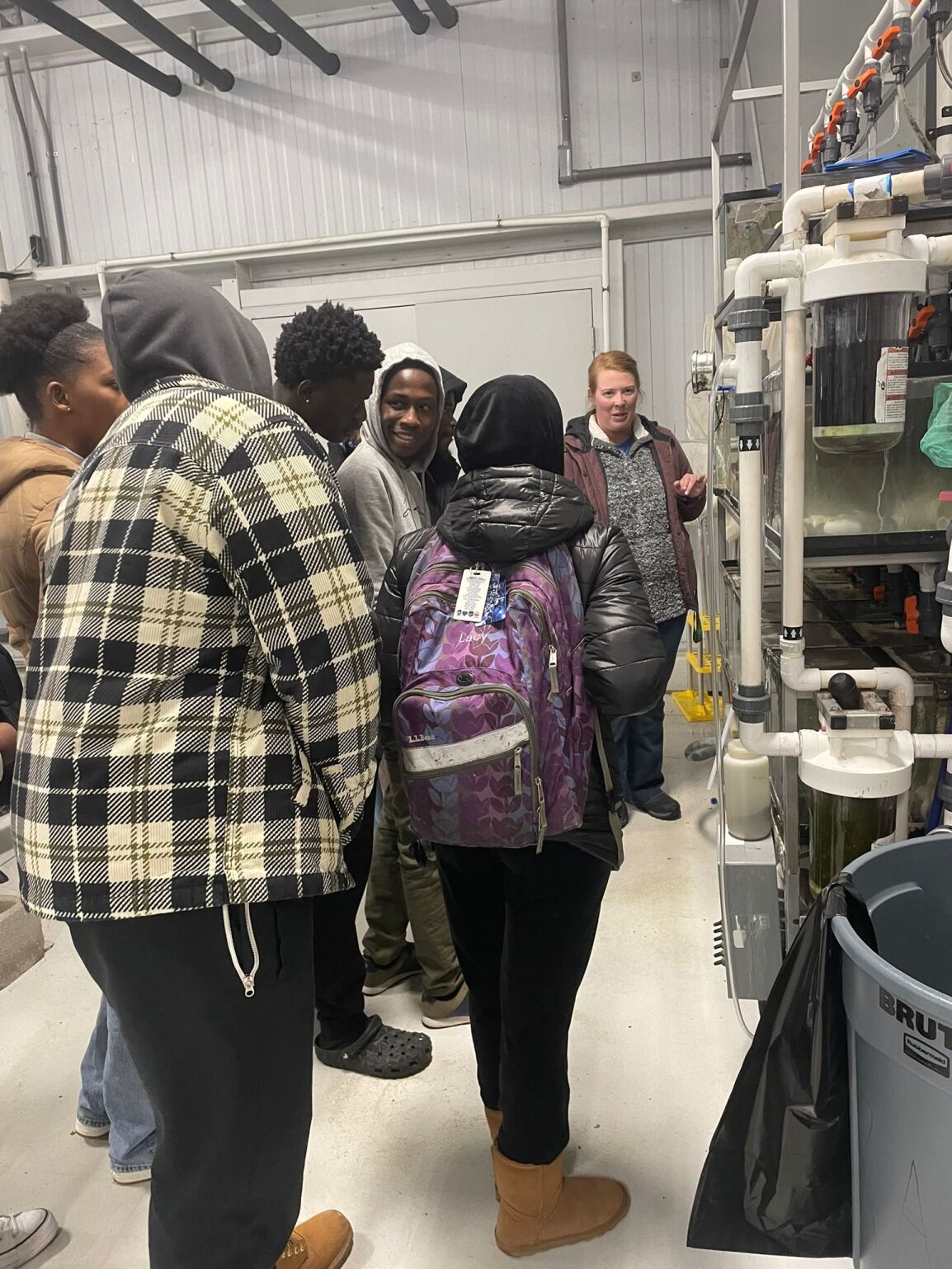
Kentucky State University is known for its renowned aquaculture research facility.
The aquaculture division collaborates with the Urban Ag team to allow opportunities
for students to learn about aquaponic and CEA systems. Students learn how to maintain
the systems and troubleshoot issues to produce quality vegetables. These aquaponic
systems combine fish production (aquaculture) with hydroponic plant production, with
the fish waste providing nutrients to feed the plants. This collaboration fosters
many research ideas and hands-on learning experiences.
Learn More
Travel

The Urban Agriculture team travels often to collaborates with the USDA Agriculture Research Service research sites and present research at renowned conferences. The team recently visited Charleston, South Carolina, to tour the USDA Vegetable Laboratory. They have also traveled to USDA ARS sites at the University of Toledo and The Ohio State University in Ohio. A couple of students are conducting their thesis research on nutrient accumulation in watercress and upland cress in hydroponic systems at a greenhouse facility. The team has also attended professional conferences like the Kentucky Academy of Science, Professional Ag Workers, and Posters at the Capitol to showcase their research. They will also be attending many renowned conferences, such as the American Horticulture Society Meeting (ASHS).
Agriculture Degree Options
While students in any major can get involved, the Urban Agriculture experience complements the College of Agriculture, Health, and Natural Resources baccalaureate degree program in Agriculture. Kentucky State University offers these degree options in Agricultural Systems, Nutritional Science and Food Systems, Environmental Systems, and Aquaculture Systems.
Urban & Controlled Environment Agriculture Team at Kentucky State University Provides Interdisciplinary Approaches for Students
By: Cora Teets & Dr. Adekunle Adeyeye
Kentucky State University's College of Agriculture, Health, and Natural Resources provides a transformative educational platform through its Urban Agriculture and Controlled Environment Agriculture (CEA) program. Under the leadership of Dr. Theoneste Nzaramyimana, Assistant Professor of Urban Agriculture and Controlled Environment Agriculture, the program offers a highly interdisciplinary and practical experience that integrates hands-on research, teaching, and community engagement. The Urban Ag/CEA team comprises a diverse group of undergraduate and graduate students from multiple academic disciplines, supported by dedicated staff and research associates. Collectively, the team is committed to advancing sustainable food production systems, particularly in urban settings, while preparing students for future careers in agriculture, research, healthcare, environmental stewardship, and public service.
Urban agriculture, or controlled environment agriculture, is the practice of growing food in cities using modern techniques that allow producers to manage the conditions in which food is grown. Urban and controlled environment agriculture focuses on innovative food production systems that enable cultivation in non-traditional growing environments such as rooftops, warehouses, high tunnels, greenhouses, and repurposed urban spaces. Using technologies such as hydroponics, aquaponics, vertical farming, and advanced environmental control systems. The producer can precisely regulate variables such as temperature, humidity, light intensity, nutrient levels, and CO₂ concentration to produce food consistently, producing high-quality food regardless of outside conditions. This high level of control allows year-round production of high-quality crops, independent of external weather conditions, while maximizing resource efficiency. Urban agriculture and controlled environment agriculture help to create food equity by minimizing the distance between food production and consumption. Urban agriculture also addresses critical issues such as food insecurity, transportation costs, and urban food deserts, thus supporting sustainable and healthy living in urban areas.
At Kentucky State University, the Urban Ag/CEA program embodies these principles by combining innovative research with applied student training, contributing to food equity and sustainability both on campus and within the surrounding community. Food insecurity poses a significant problem in our world today, and many people lack access to affordable, healthy, and fresh vegetables. Our team is committed to building more just and equitable food systems that give everyone access to healthy food and empowers people to grow their own food. Students donate fresh vegetables produced at the student-run farm to the campus and community during the harvest seasons to enhance nutritional status and decrease food insecurity on their campus and community. Research, education, and practice in agriculture are vital to developing sustainable food systems that produce healthy food while protecting the environment.
The urban / CEA team operates a student-run farm on the Kentucky State University Harold Benson Farm and leads an Urban Agriculture research lab in the Atwood research facility. A hallmark of the program is the integration of hands-on, applied learning experiences. Students work directly on the KSU Harold Benson Research and Demonstration Farm, where they manage multiple growing systems including high tunnels, raised beds, hydroponic nutrient film technique (NFT), deep water culture (DWC), and conventional greenhouse systems. Through these experiences, students acquire skills in propagation, transplanting, integrated pest management, drip irrigation installation, crop planning, nutrient management, and equipment operation (e.g., BCS tractor, weed eaters, and irrigation systems).
The students are involved in various hands-on learning opportunities on the student-run farm, urban agriculture lab, professional research conferences, and extension demonstration and outreach programs. The student research assistants in the Urban Agriculture/ CEA program learn about various aspects of agriculture, such as controlled environment agriculture, research methodology, team building, and food production. This program supports staff and student research projects, lab activities, and course- based projects.
Additionally, graduate students mentor undergraduate peers, assisting them in research design, data collection, literature reviews, and scientific writing. This peer-to-peer mentorship structure not only develops technical competence, but also fosters leadership, communication, and teamwork—all essential skills for future careers in academia, industry, and public service. Students actively engage in research activities, including controlled studies examining nutrient optimization, plant growth responses, and yield performance in hydroponic leafy greens, tomatoes, and other high-value crops. Students also develop crop plans for production spaces and learn propagation, seeding, and transplanting methods. They also create strategies for integrated pest management and plant disease mitigation in various controlled environment agriculture spaces.
Research projects often contribute to ongoing investigations in nutrient biofortification, light spectrum optimization, and sustainable production practices, reflecting real- world challenges in modern agriculture. For instance, the student-run farm greenhouse and high tunnel feature hydroponic deep-water culture and NFT systems that produce various leafy green vegetables. These hydroponic soilless agriculture systems are used in research studies that study the effects of nutrient fertilization on leafy green production. The Urban Ag/CEA program is intentionally interdisciplinary, bringing together students from a variety of academic backgrounds that enrich both the research and educational environment. Our students are from various academic backgrounds, including undergrad majors in nursing, computer science, agribusiness, environmental science, and plant science. Our graduate students are all studying environmental systems with a focus on controlled environment agriculture. Each graduate student mentors at least one undergraduate student alongside our research associates and the principal investigator. Each of our students is from different backgrounds and geographic areas like Nigeria, Rwanda, the Republic of Congo, Ghana, and various states (e.g, Arizona, Ohio, Kentucky) across the United States. They all work together and learn from each other on their research journeys. Each student has knowledge to contribute from their perspective on academic fields and personal experiences in agriculture, computer science, nursing, and environmental studies. This diverse blend of academic disciplines fosters a rich collaborative environment where students learn from each other's unique perspectives while working toward a common research and outreach goal.
- Agriculture and Plant Science Majors bring technical expertise in crop production, soil science, fertility management, and farm operations. They contribute to research design, farm management, crop variety selection, and implementation of sustainable agricultural practices. Our agriculture majors provide valuable insight into crop production and agriculture systems by providing technical assistance in the setup and maintenance of our student-run farm crops, equipment, soil, and agriculture inputs. They provide insight into the best tools, crop varieties, and resources for our agricultural research and production to make efficient and productive research systems.
- Computer Science Majors support data-driven agriculture through sensor deployment, environmental monitoring, database management, and digital analysis. Their skills in programming, data visualization, and statistical modeling are essential for tracking variables such as electrical conductivity, pH, CO₂, dissolved oxygen, and nutrient uptake, while also developing inventory systems, media content, and data analysis tools using platforms such as Excel, Airtable, Adobe, and Canva. Their computer science skills can also be applied to statistical analysis for research and website development for the media team.
- Nursing Students contribute health-focused perspectives by linking agricultural
production with human nutrition and wellness. They help develop educational outreach materials such as recipe cards, nutrition fact sheets, and health promotion resources that highlight the nutritional benefits of fruits and vegetables produced by the student-run farm. These extension publications can be used as outreach and educational materials to enhance the health status of the study body and community members.
- Agribusiness Students apply business and marketing principles to strengthen the farm’s operational sustainability. They assist with farm economics, market development, promotional branding, social media management, and the development of outreach materials such as brochures, flyers, and merchandise, helping the program communicate its impact to broader audiences. Our student interns in agribusiness can contribute a business outlook for our student-run farm production and media advocacy, as they can provide valuable business skills to marketing Kentucky State University produce and showcasing the student-run farm and urban agriculture team brand. They help us with media marketing through developing a professional social media presence, promotional items (e.g, stickers, brochures, flyers), and showcasing our progress through our urban ag/ CEA website.
- Environmental Science Majors contribute expertise in sustainability, resource
conservation, and climate adaptation. Our environmental science research assistants provide a valuable perspective on the environmental effects of urban agriculture and how to mitigate effects like climate change and soil erosion to help us create a sustainable agriculture system. They can also help us use natural pesticides and herbicides in our student-run farm production to keep our plants, environment, and consumers healthy. Their knowledge helps inform soil health strategies, integrated pest management using natural biocontrols, and environmental impact assessments that promote long-term agricultural sustainability.
In addition to research and farm operations, the program places strong emphasis on student professional development. The Urban Ag/CEA team actively participates in academic conferences, poster presentations, and scientific meetings at both state and national levels. Students have presented their research at venues such as the Kentucky Academy of Science (KAS), Professional Agricultural Workers Conference (PAWC), American Horticulture Society Meeting (ASHS), Posters at the Capitol, and the Controlled Environment Agriculture Summit. Several students have had a distinct opportunity to present oral presentations before Kentucky state legislators, further strengthening their public speaking, advocacy, resume, and professional
networking skills. For example, two of our Urban Agriculture undergrad students presented Posters at the Capital conference, where they had the opportunity to showcase their research, network with community and governmental members, and advocate for Kentucky State University. One of our students was the only KYSU student to do an oral presentation in front of Kentucky State Legislators and the public. Professional development opportunities are vital to preparing students for the professional work sector and higher fields in academia.
The Urban Ag/CEA program goes beyond education and research to make a tangible impact on food security within the Kentucky State University campus and the surrounding community. Fresh vegetables produced by students on the farm are donated to campus dining services and local food distribution centers, directly addressing food access challenges while providing healthy, nutrient-rich produce. Educational workshops, extension demonstrations, and outreach programs engage the broader community, empowering local residents with knowledge and skills to grow food sustainably within their own neighborhoods.
Meet Our Brilliant Team !
Get to know the passionate people turning vision into reality.